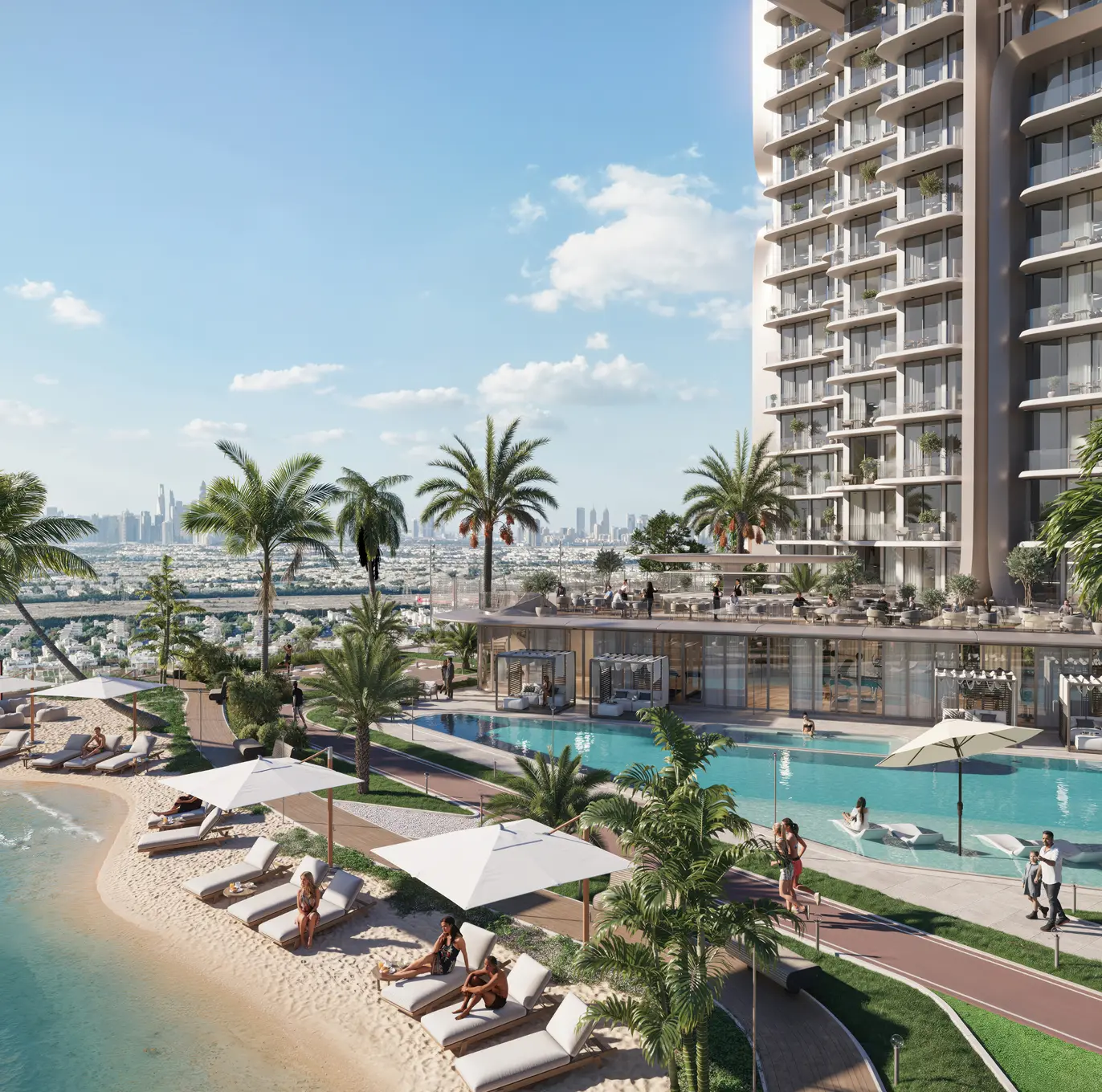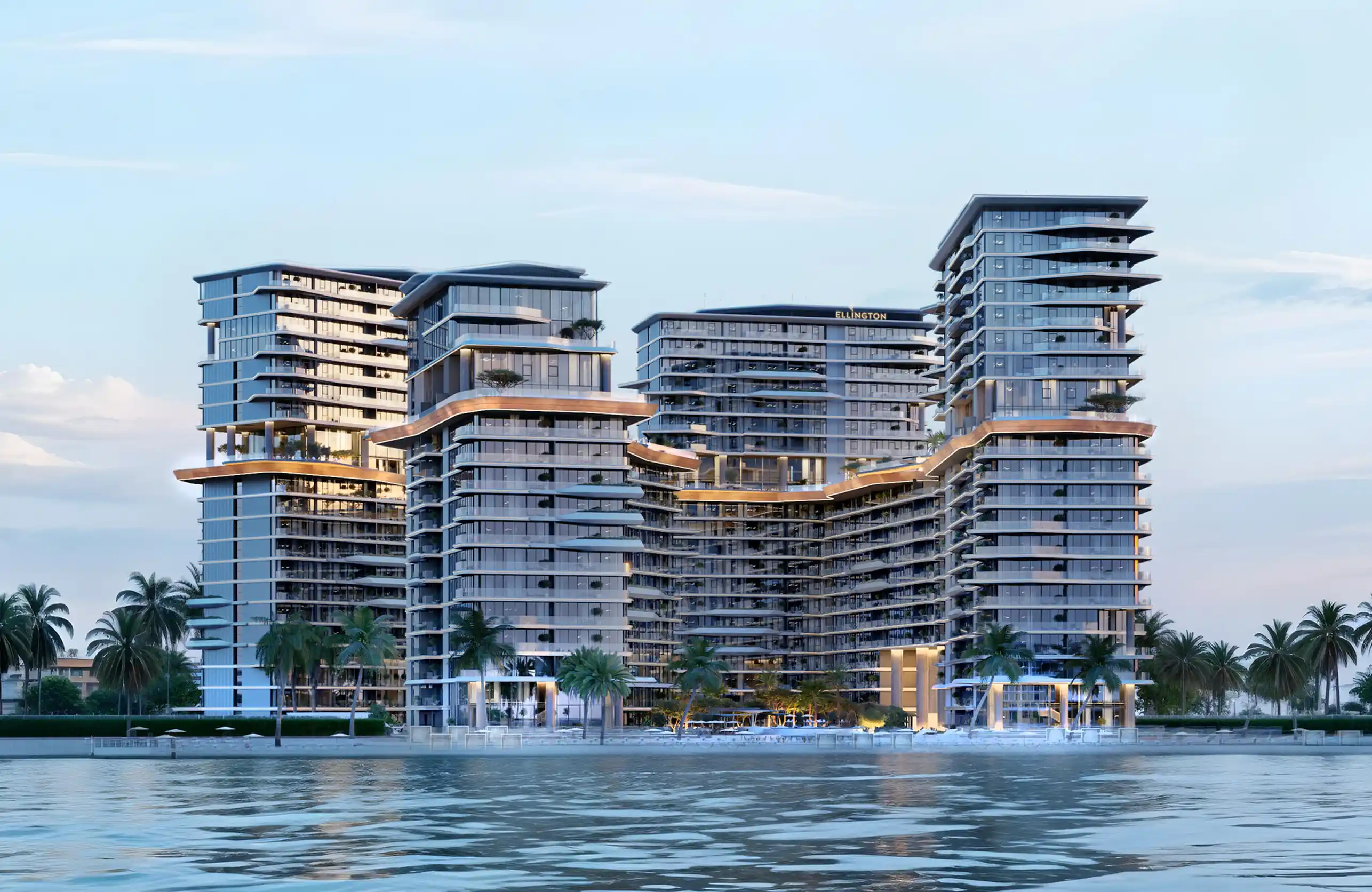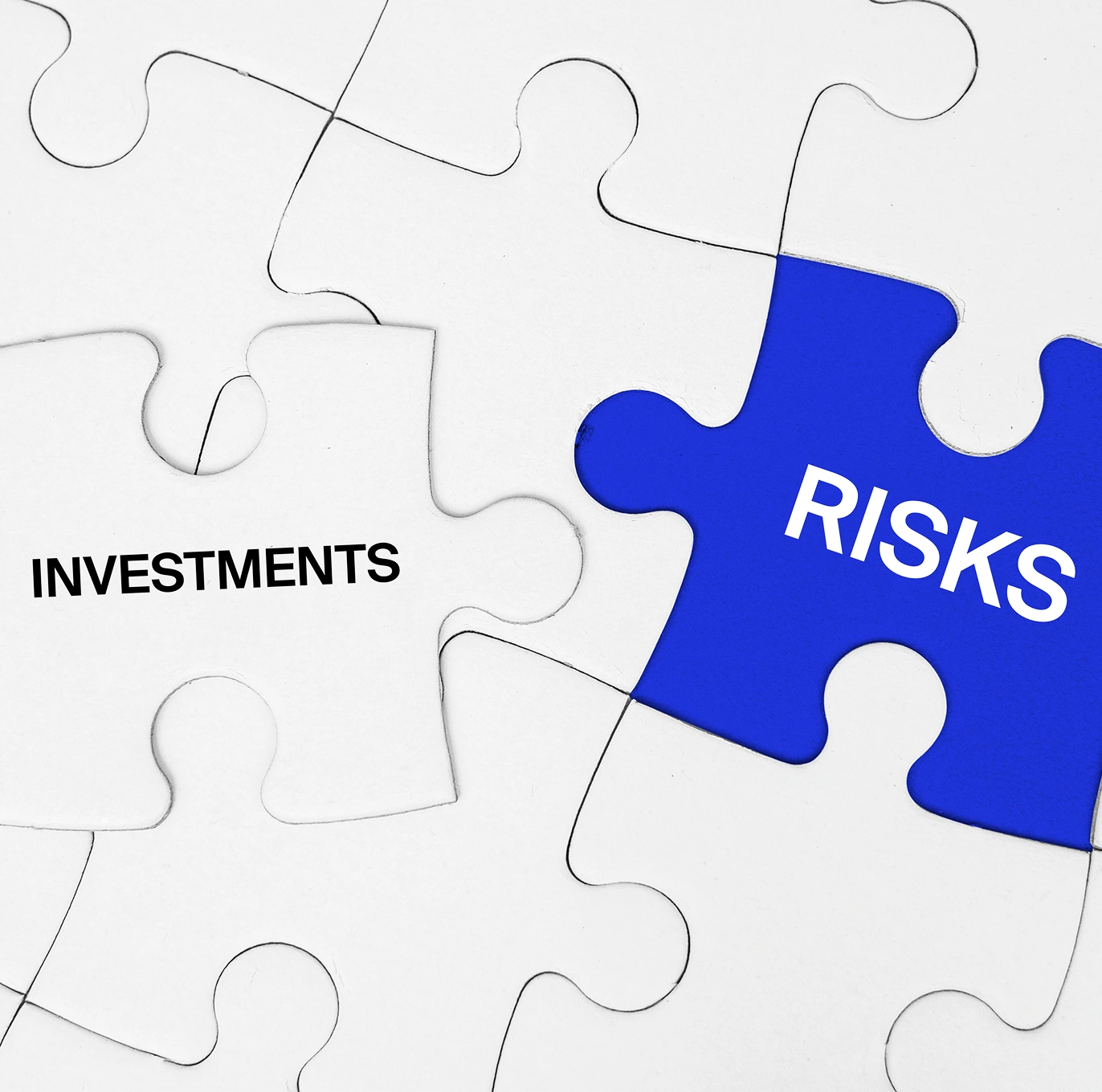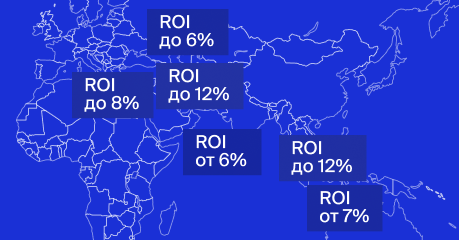Top 10 property investment risks in Thailand and how to avoid them: expert guid


Grigory Kosych
Teamlead
Thailand remains a top destination for foreign property buyers in 2025. Rental yields of 5–12%, annual price growth of up to 15%, and accessible entry from $100,000 make it attractive. Phuket alone saw 4 million tourists in the first quarter, driving strong rental demand.
Yet despite strong fundamentals, success is far from guaranteed. Around 80% of first-time foreign investors take a loss on their investment — most often because they overlook critical details: location-specific dynamics, hidden costs, and legal restrictions.
This guide breaks down the most common risks and explains how to avoid costly mistakes — with a focus on practical decisions and real market conditions.
5 reasons why Thailand attracts foreign property buyers
Buying property in Thailand has become increasingly attractive in 2025. The country offers great investment opportunities, a high standard of living, and clear rules for international buyers. On top of that, its property market is growing fast.
1. High rental demand driven by tourism. Thailand is a world-famous tourist destination, especially areas like Phuket. In the first three months of 2025, nearly 4 million tourists visited Phuket alone, with 17,000 to 18,000 international arrivals each day.
Well-located properties are easy to rent out short- or long-term. Many owners earn rental returns of 5–12% per year in strong currencies like the US dollar.
2. Growing property prices. The Thai real estate market is seeing consistent price increases. In popular areas like Bang Tao and Nai Harn in Phuket, property prices are rising by up to 15% per year during the construction stage and by up to 8% after the project is completed.
Waterfront properties and projects with good infrastructure are especially popular. As land becomes more limited, prices are expected to keep going up.
3. Affordable entry and flexible payments. You don’t need a huge amount of money to start investing. New studio apartments start from $100,000. Many developers offer interest-free instalment plans with flexible terms.
4. Modern homes with resort-style facilities. New residential complexes in Thailand offer more than just a place to live. They often include swimming pools, gyms, restaurants, children’s clubs, wellness centres, shopping areas, and even water parks.
Many of these properties are managed by international companies, providing reliable service and making it easy for owners to earn passive income.
5. Easy visa rules and property ownership. Thailand offers visa-free entry for citizens of 93 countries. Visitors can stay for long periods with ease.
Foreigners can legally buy property in Thailand, either as freehold or leasehold. Buyers can pay in dollars, euros, Thai baht, or other currencies, depending on the developer's policy. The government is working on making the buying process even simpler.

Need help finding the right property?
We remove the guesswork from property investment by vetting each developer for track record, financial stability and buyer feedback — offering only secure, high-potential options
10 key risks of buying property in Thailand
The rewards of buying property in Thailand can be significant, but the process is not without its challenges. Alongside attractive price points and rental potential, buyers must be aware of the risks that can undermine their investment.
Some issues may lead to financial loss, while others can reduce rental income or create long-term management problems. In a fast-evolving Thai property market, it’s not enough to rely on sales pitches. Informed investors take the time to understand the risks and apply a thorough due diligence process before committing to any transaction.
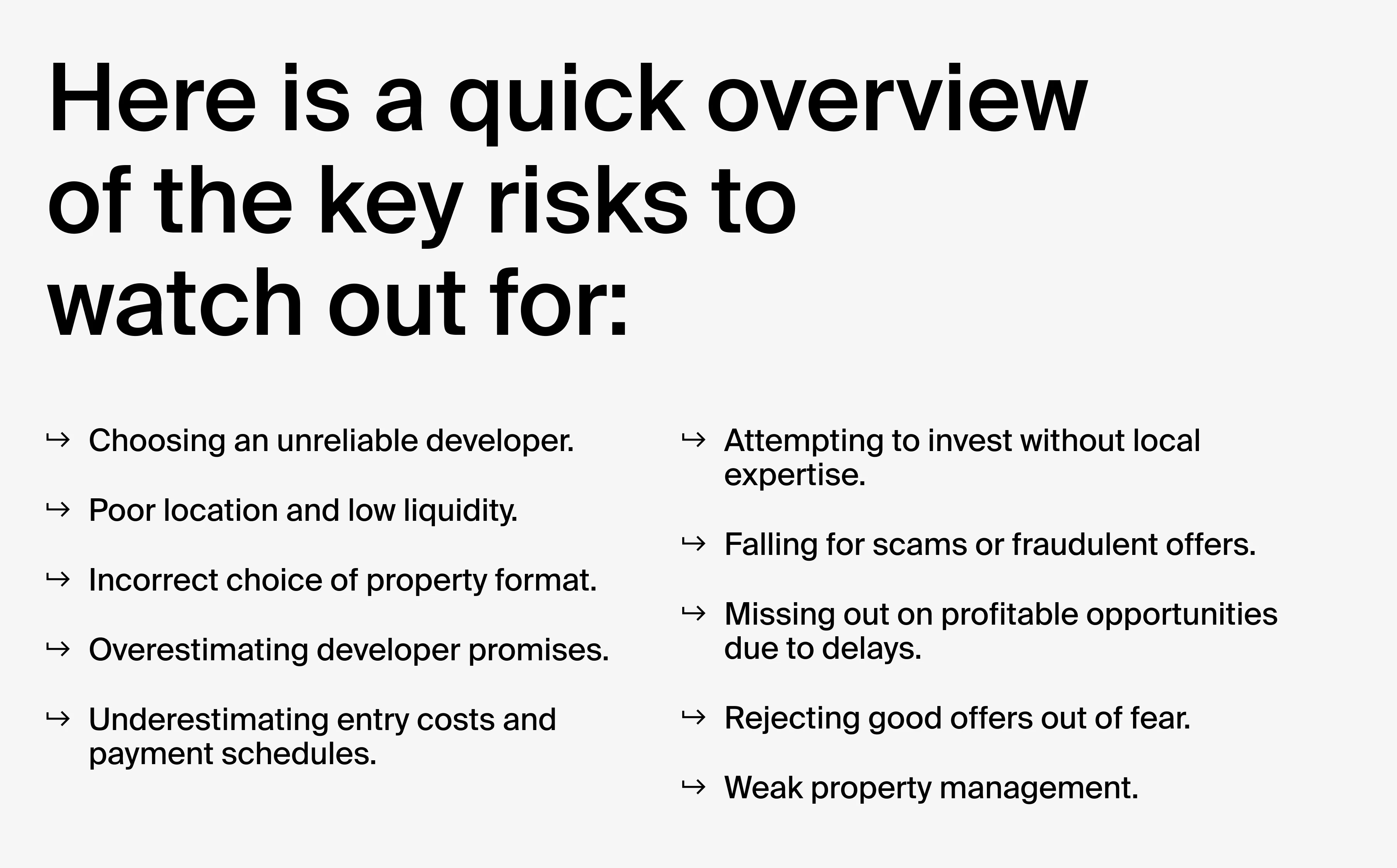
Risk #1. Choosing an unreliable developer
A client once bought two units remotely and later turned to Neginski for help with the handover. Instead of the promised high-quality finishes, the developer delivered apartments with rusted fixtures, mould, and uneven walls. It turned out to be the first project by an unknown developer.
This case highlights that choosing an unreliable or inexperienced developer is one of the most serious risks when buying property in Thailand. A limited track record, vague documentation, or lack of transparency can also result in construction delays, unfinished projects, or legal disputes — all of which may lead to direct financial loss.
Common warning signs include refusal to provide official permits, unclear statements about the project's legal status, and non-compliance with Thai building regulations.
Unlike some other countries, Thailand does not use escrow accounts for property transactions. While certain developers link payment schedules to construction progress, this practice is not universal. In most cases, buyers pay in instalments, but legal ownership is transferred only after full payment and formal registration with the Land Department.
The purchase agreement is a primary layer of protection. It must clearly specify payment terms, transfer conditions, and the developer’s obligations. For example, if the handover is delayed by more than one year, financial penalties typically apply — but only if specified in the contract.
How we eliminate this risk at Neginski
We begin by thoroughly vetting the developer’s history, focusing on completed projects, legal clarity, and financial transparency. We ask direct questions about permits and construction timelines. Our local legal and technical teams ensure full compliance with Thai law.
This approach filters out up to 70% of projects. Our analysts recommend only the carefully selected remainder to clients.
Here are several projects that have successfully passed our due diligence process and meet key safety and reliability criteria for investment.
Risk #2. Poor location and low liquidity
The location of a property in Thailand has a direct impact on its investment performance. Even a stylish, well-built unit may struggle to rent or sell if it is far from important amenities like beaches, shops, restaurants, or transport.
In Phuket, apartments usually start at $100,000 and villas at $400,000. Still, the market includes many “hot” deals at lower prices. These can seem attractive at first, but often come with downsides — such as being located far inland, in older areas with little infrastructure or tourist appeal. As a result, these properties may stay empty longer, be harder to resell, and bring in lower returns.
On the other hand, homes in popular areas of Phuket like Bang Tao, Rawai or Nai Harn tend to perform much better. They attract more interest from both renters and buyers, offer stronger rental income, and often grow in value by up to 5–15% per year.
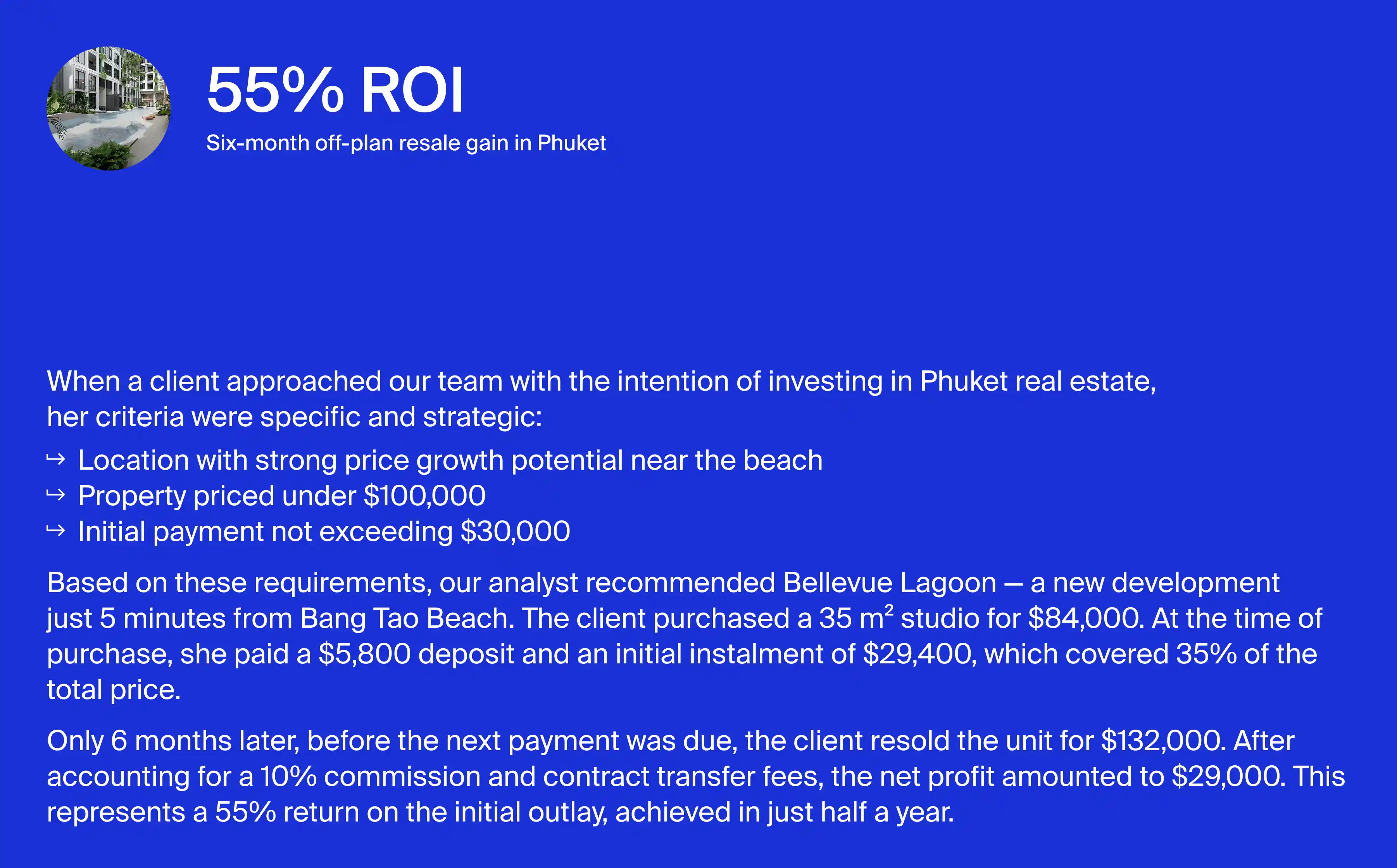
Risk #3. Incorrect choice of property format
Choosing the wrong property format for your investment goals is a common and costly mistake in the Thai real estate market. It’s not just about size or price — it’s about how well the property fits the intended rental or resale strategy.
For short-term rentals in tourist areas, fully furnished condos are in high demand, especially compact or two-bedroom units, which appeal to couples and families on short visits. Villas can also perform well — particularly when targeting groups, families or companies looking for holiday stays.
For long-term lets, location and amenities become more important than property type. Expat families typically prefer quiet neighbourhoods near schools and green spaces, while digital nomads often look for pet-friendly policies, coworking zones, and modern interiors.
A studio in a family suburb or a luxury villa in a party district may struggle to attract consistent tenants if misaligned with local demand.
If the goal is to resell, factors like distance to the beach, access to infrastructure, and project uniqueness have a major influence on future value. A standard condo far from the coast, even if well built, is harder to exit than a beachfront unit in a high-demand area.

Grigory Kosych
Teamlead
Foreigners can legally own both condominiums and villas, but under different terms:
For condominiums, freehold ownership is available — but only up to 49% of the building’s total area. Beyond that, units are sold on a leasehold basis.
Foreigners cannot own land, so villas are usually sold as freehold buildings, with the land beneath them held on leasehold.
The security of ownership does not depend on whether it is freehold or leasehold, but on the clarity of the contract and proper registration with the Land Department.
Grigory Kosych
Teamlead
Risk #4. Overestimating developer promises
Many investors are drawn to bold marketing claims — 20% annual rental yields or 100% capital growth — but such figures often reflect best-case scenarios, not realistic outcomes.
In practice, a property’s performance depends on several factors:
Location
Timing
Purchase price
Quality of management
When developers promote unusually high returns or rapid price appreciation, these promises frequently fall short. Lower occupancy rates, hidden costs, or vague contract terms can quickly reduce actual yields. Relying solely on promotional claims often results in disappointment — or direct financial loss.
How we eliminate this risk at Neginski. We independently validate every developer claim. Our analysts study local market trends, examine comparable properties, and assess whether rental projections are achievable. We also insist on full contractual clarity and advise only on projects with proven demand.
This approach protects our clients from inflated expectations and ensures their investment decisions are grounded in market reality.

Know your returns before you invest
We’ll assess your goals and opportunities and run the numbers
Risk #5. Underestimating entry costs and payment schedules
Thailand’s low entry prices and 0% instalment plans attract many foreign investors. Most plans require 20–35% upfront, with the rest paid during construction. Some even allow up to 50% to be paid after completion, at interest rates of 3–7%.
While flexible, these plans demand careful budgeting: missed payments can lead to penalties or contract cancellation.

Grigory Kosych
Teamlead
Case in point: one buyer purchased two units off-plan, expecting to resell before completion. The sales didn’t go through, and with no backup funds, they were unable to continue payments. This happened because the buyer overestimated their financial capacity and chose a strategy that didn’t fit the asset.
Grigory Kosych
Teamlead
To avoid such situations, work with a qualified advisor who can match your strategy to your budget. And always account for hidden costs — maintenance, taxes, legal fees, and furnishing — often excluded from advertised prices.
Risk #6. Investing without local expertise
Buying property in Thailand without on-the-ground support introduces a high level of risk. Foreign investors often lack familiarity with Thai property laws, ownership structures, and regional processes. This can lead to errors such as incomplete documentation, misjudged legal standing, or contracts that cannot be enforced.
Without trusted local advisors, buyers may unknowingly invest in projects that lack proper permits, face community resistance, or have hidden liabilities. Developers are not always forthcoming about risks, and many foreign buyers don’t know what to ask — or what to verify.
How we eliminate this risk at Neginski. We see local expertise as non-negotiable. Our regional analysts live where they work, understand the nuances of Thai law, and maintain direct relationships with verified developers.
Only 30% of available market offers pass our internal screening. This is how we filter out high-risk projects — offering our clients a level of due diligence no remote investor can replicate on their own.
Risk #7. Falling for scams or fraudulent offers
Thailand’s dynamic property market has attracted not only investors but also fraudsters. Scams range from fake listings and bogus investment schemes to impersonation of legitimate estate agencies. These schemes are often sophisticated, using real branding, high-pressure tactics, and promises of unusually high returns to deceive buyers.
A common tactic involves someone posing as an agent from a known firm, contacting prospects via messaging apps and urging them to act quickly. Victims are often persuaded to transfer money for a “trading deposit” or secure a “special deal” that never exists. Once funds are transferred, the fraudster vanishes, and recovery becomes difficult.
The Thai legal system provides protections, but only for transactions conducted through official, documented channels. Refusal to share contracts, ID, or verified credentials is a red flag that should not be ignored.

Ksenya Kadesnikova
Investment-Focused Market Analyst
At Neginski, we have witnessed numerous scam attempts involving individuals impersonating our agency. These fraudsters often contact people unsolicited, claim to represent us, and promote advance payments or fake investment schemes.
Our official stance is clear: if you have not submitted a request and someone contacts you claiming to be from Neginski, it is a scam.
In such cases, we urge you to block the contact and report it immediately. We communicate exclusively through verified channels, and every client interaction is backed by full documentation and legal safeguards.
Ksenya Kadesnikova
Investment-Focused Market Analyst
Risk #8. Missing out on profitable opportunities due to delays
Thailand’s real estate market moves fast — especially in high-demand areas. Desirable units, early pricing, and pre-launch deals are often snapped up within days. Investors who hesitate may find themselves facing significantly higher prices, limited inventory, or missed chances for high returns.
Waiting too long can mean settling for less attractive units, or missing out entirely on projects that quickly become fully subscribed. While caution is important, excessive delays often result in lost opportunities and reduced profitability.
How we eliminate this risk at Neginski. We track project launches and market activity in real time. This allows us to present our clients with early-stage opportunities — often before they appear on public listings.
We help clients act decisively when all key criteria are met, combining thorough checks with market agility. The best returns are often secured not just through what you buy, but when you buy it.
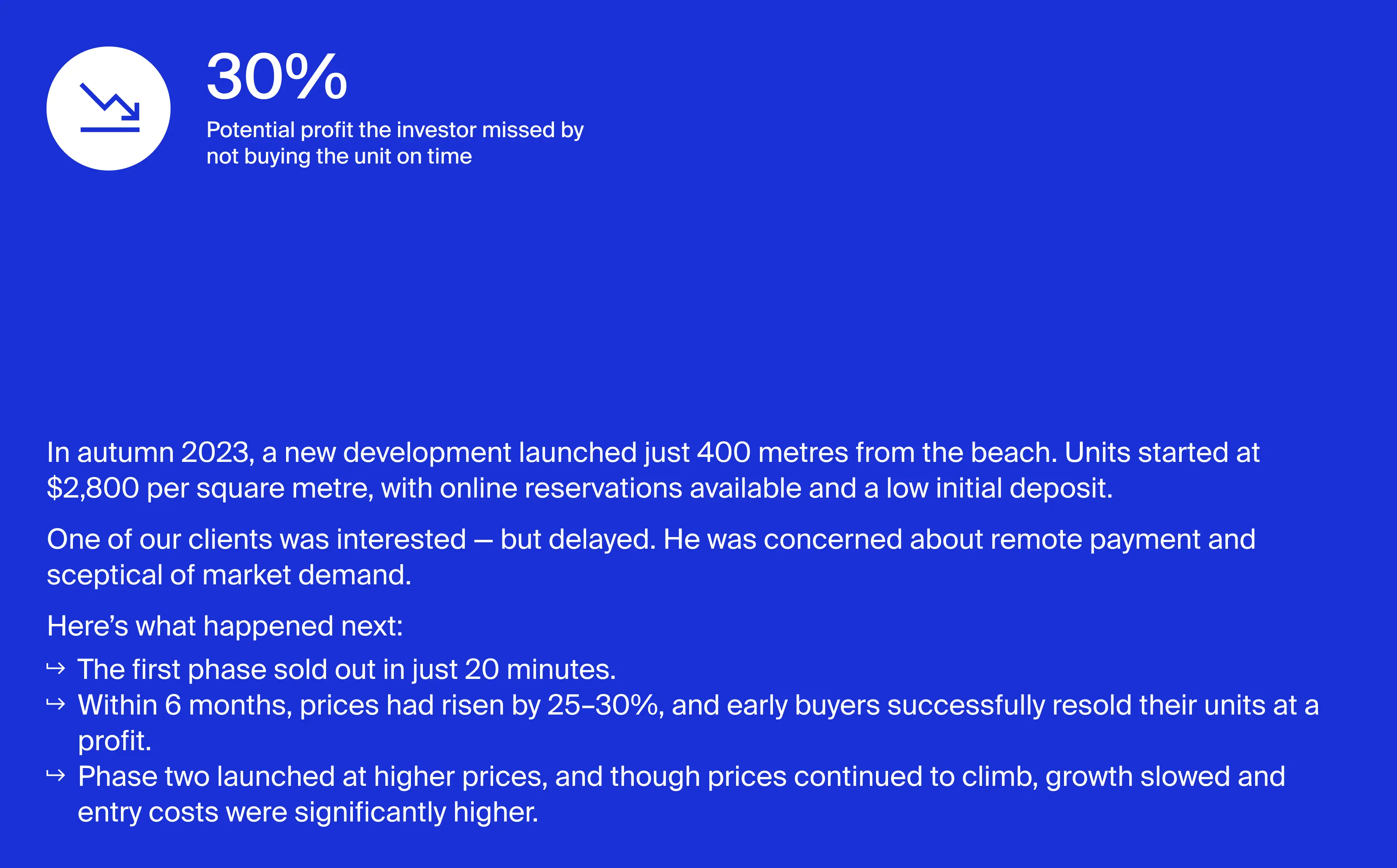
Risk #9. Rejecting good offers out of fear
Thailand’s booming property market is full of tempting opportunities — low entry prices, high promised returns, and limited-time deals. While some of these offers are too good to be true, others are genuine early-bird discounts available during presale stages. The challenge lies in distinguishing between the two.
Presale phases can offer real savings of up to 30%, but these deals are time-sensitive and often close quickly. Overly cautious investors who automatically dismiss such offers may miss out on substantial profits. Yet, acting without verification can lead to investing in underperforming or risky projects.
The key is striking a balance between healthy scepticism and informed decisiveness.

Grigory Kosych
Teamlead
In spring 2025, a well-known Phuket developer — previously focused on apartments — launched their first villa project. Located just 500 metres from Naiyang Beach, units started at $570,600. This was 30–40% below comparable listings in the same area.
One of our clients chose not to invest at launch. The price seemed unusually low, and he was uncertain about the developer’s experience with villas.
Here is how it unfolded: the first phase sold out within a month. Just 2 months later, one of the villas appeared on the resale market at 15% above its original purchase price, with a queue of interested buyers already in place. The same client has since returned and asked to be added to the early reservation list for phase two.
Grigory Kosych
Teamlead
Risk #10. Weak property management
Even a well-located, high-quality property can underperform if management is weak or absent — a risk that’s especially relevant for foreign investors. Poor maintenance, missed bookings, and lack of guest support often translate into negative reviews, reduced occupancy, and inconsistent returns.
Many buyers focus on the developer and location but overlook a critical question: who will manage the property after purchase? Overseas ownership requires a dependable team to handle daily operations — from cleaning and repairs to guest communication and platform coordination. Without that support, even strong assets may stay vacant or lose market appeal.
How we eliminate this risk at Neginski. Our team evaluates the property management setup with the same rigour as we do location and legal structure. We prioritise projects with in-house management or partnerships with proven operators — often international hospitality brands or seasoned local firms. This ensures high service quality, efficient operations, and the peace of mind our clients need when investing remotely.

Focus on the profits — we’ll take care of the rest
From paperwork and tenants to daily management, our Care Department handles every step of your property investment
Checklist for safe property buying in Thailand
Use this expert-backed checklist to minimise risks and make smart decisions. It covers key legal, financial, and practical steps every foreign buyer should take before committing to a property in Thailand.
1. Choose verified developers. Stick to those with a solid reputation and transparent records. Your due diligence should include reviewing past projects and developer credibility.
2. Verify legal status. Ensure the project has all permits and that title deeds are legitimate. A professional title search is a must.
3. Know the ownership model. Understand the difference between freehold and leasehold agreements.
4. Understand payment terms. Use interest-free instalments, but plan carefully for each stage of payment.
5. Count all costs. Factor in registration fees, taxes, maintenance, and management to get a full financial picture.
6. Prioritise location. Pick properties near beaches, shops, and leisure areas. Check future infrastructure plans and evaluate the surrounding area carefully.
7. Match property type to investment strategy. If you're buying for rental income, align the layout and features with your target tenant. For example, for short-term rentals, prioritise what tourists value — such as proximity to the beach. For other strategies, focus on what matters most to that specific goal.
8. Check long-term liquidity. Whether you plan to resell, rent out, or use the property part-time, choose a unit with strong resale potential. Prioritise view, standard layouts, and location — these factors make the property easier to sell if needed.
9. Buy turnkey units — if rental is your goal. For rental income, prioritise fully finished and furnished properties to avoid delays and extra setup costs. For personal use or resale, full fit-out may not be necessary. Choose based on your strategy.
10. Evaluate management. Choose projects with proven management for smooth rentals and clear reporting.
11. Clarify rental models. Understand the difference between the short- and long-term rental models, as well as guaranteed yield and rental pool options — and pick what fits your goals.
12. Work with local experts. Don’t go it alone — use professional consultations and tools to filter out risky projects and identify high-potential opportunities. Expert advice helps you make informed decisions and avoid costly mistakes.
13. Verify agent identities. Never send money to unknown contacts or unofficial channels — these are common signs of scams.
14. Act quickly on good offers. Early buyers get the best prices and units.
Summary: avoiding mistakes when buying Thai property
Investing in property in Thailand offers unique lifestyle and profit opportunities — but it requires careful analysis and a strategic approach. As the market becomes more dynamic and attractive to foreign buyers, so do the risks — from unreliable developers and poor locations to legal, financial, and cultural pitfalls. Real-world cases show that success often hinges on preparation, timing, and expert guidance.
Smart investors prioritise location, verify details with local analysts, and choose vetted projects with clear payment terms and strong management. Understanding ownership formats, rental models, and actual costs helps avoid common traps and boost returns.
With the right strategy, Thailand remains one of the most promising real estate destinations in South-East Asia for 2025 and beyond. Make informed decisions, act on real opportunities, and let your investment work for you — not against you.
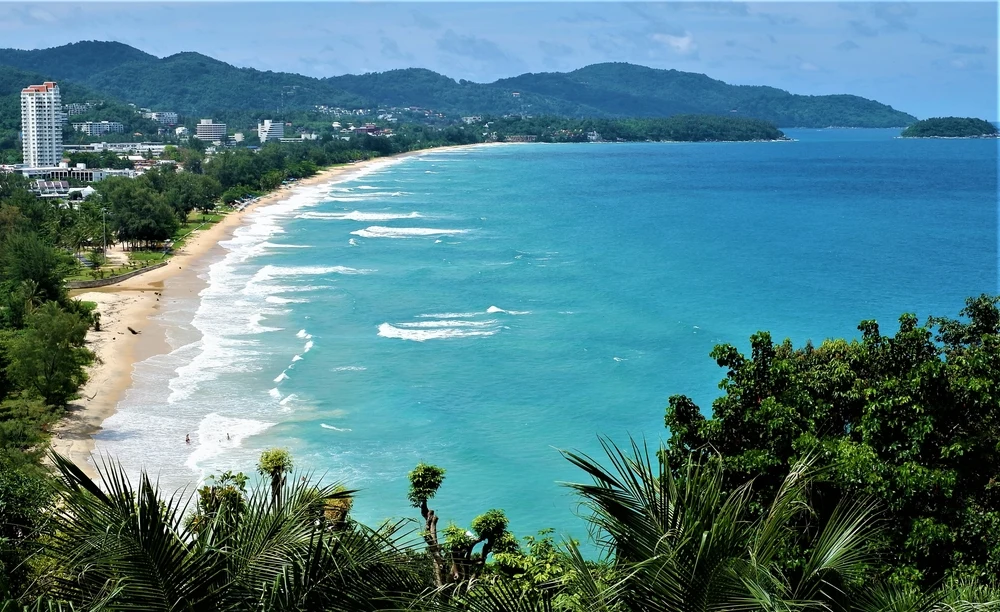
Want early access to top investment deals?
We’re among the first to know about Thailand’s hottest presales — and we help clients secure the best units before public launch. Book a consultation to explore high-yield opportunities
FAQ
-
The key risks of buying Thai property include dealing with unreliable developers, poor locations, hidden legal complexities, and misleading promises. Foreign buyers may also struggle with unclear title deeds, unexpected legal fees, and a lack of understanding of local laws.
To reduce these risks, conduct thorough due diligence, including a title search at the Land Department, and consult a local law firm or licensed real estate agent before completing any real estate transactions.
-
When planning a property investment in Thailand, assess the surrounding area, market property prices, tenant demand, and potential rental income. Confirm the project has a construction permit, check the developer’s record with previous buyers, and verify that the property has a clear and legal title. Use a law firm to guide you through the property transactions process and ensure your investment purposes align with local regulations.
-
Foreign investors face foreign ownership restrictions when trying to acquire property in Thailand. While foreigners can buy condominium units freehold — up to 49% of a building’s area, direct land ownership is not permitted. To access land, foreign buyers may use lease agreements. Understanding these laws is vital for safely owning property as a foreigner.
-
Leasehold agreements allow foreigners to legally acquire property rights in Thailand. These contracts typically last 30 years, with extensions up to 90 years. While leasehold is not full ownership in the traditional sense, it provides secure long-term use — including the right to rent out, resell, or renovate the property — all protected under Thai law.
Foreigners cannot own land directly, so land is always acquired via leasehold. Villas and condos can be bought either freehold or leasehold, but leasehold is more common among foreign buyers due to its lower entry cost and simpler structure.
-
Every foreign investor should complete a full due diligence process before buying Thai property. This includes verifying the developer’s background, checking for a valid construction permit, confirming legal title at the Land Department, and reviewing the title deeds with a local law firm. A thorough title search helps ensure the property is safe to buy.
At Neginski, only 30% of quality properties pass our internal screening, ensuring safe and informed investment decisions.
-
In poorly managed buildings, foreign buyers often face hidden costs like excessive maintenance fees, poor occupancy due to weak marketing, and surprise charges for repairs. Low-quality management can leave the property virtually worthless in rental terms. These issues directly impact rental income and long-term returns. A trusted real estate agent can help identify professionally managed projects for better performance.
-
A low-priced property in a poor location may face low demand, high vacancy rates, and weak resale potential. Often, lower prices reflect cheaper construction and shorter building lifespan — leading to higher maintenance costs later on. Even in well-built projects, poor management can reduce returns. Buyers also underestimate extra costs like registration fees and ongoing service charges.
In contrast, a slightly overpriced unit in a prime area benefits from stronger demand, better infrastructure, and higher rental income — making it a safer long-term investment.
-
Select a property developer with a record of on-time delivery, verified construction permits, and positive reviews from previous buyers. Confirm the developer offers projects with registered title deeds and a valid legal title. A reliable developer will be transparent about the payment schedule, transfer fees, and any additional legal fees. Always use a law firm and estate agent to vet documents and avoid hidden risks when buying property.





